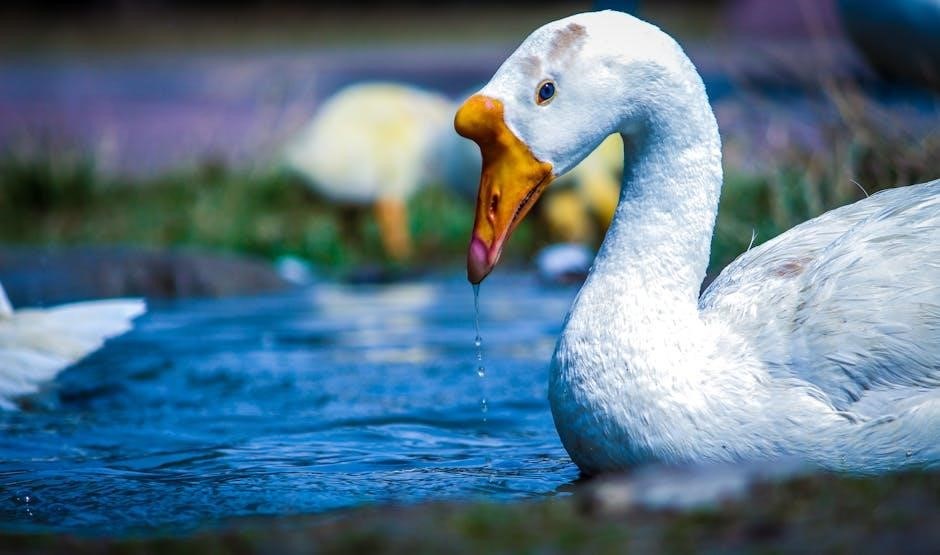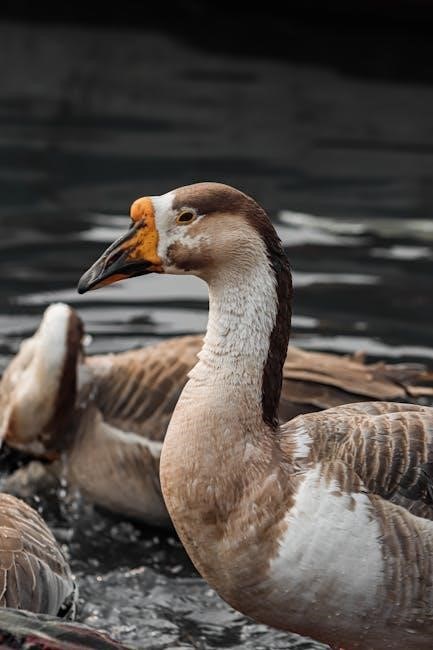Mary Oliver, a Pulitzer Prize-winning poet, is celebrated for her profound connection with nature. Her poem Wild Geese explores themes of self-acceptance and harmony with the natural world, resonating deeply with readers. This introduction delves into Oliver’s life and the essence of her iconic poem, highlighting its universal appeal and spiritual depth.
1.1. Mary Oliver: A Renowned American Poet
Mary Oliver, born in 1935, was a celebrated American poet known for her profound connection with nature and humanity. Her work, rooted in simplicity and depth, earned her a Pulitzer Prize and widespread acclaim. Through her poetry, Oliver invites readers to explore themes of spirituality, self-discovery, and the beauty of the natural world, leaving a lasting legacy in contemporary literature.
1.2. Overview of the Poem “Wild Geese”
“Wild Geese” by Mary Oliver is a poignant exploration of self-acceptance and belonging. The poem encourages readers to embrace their true selves, emphasizing the importance of aligning with nature’s harmony. Through vivid imagery and gentle guidance, Oliver reminds us that our place in the world is not determined by guilt or effort, but by embracing life’s beauty and simplicity, offering solace and inspiration to all who read it.
Themes and Symbolism in “Wild Geese”
The poem delves into themes of self-acceptance, inner peace, and the natural world’s inspiration. Symbolism highlights harmony with nature and embracing life’s beauty, offering solace and inspiration.
2.1. Self-Acceptance and Inner Peace
Mary Oliver’s Wild Geese emphasizes self-acceptance and inner peace, urging readers to embrace their true selves without guilt. The poem encourages letting go of burdens, advocating for harmony with nature and self, thus fostering a sense of belonging and tranquility in a chaotic world. This theme resonates deeply, offering comfort and inspiration to many.
2.2. The Natural World as a Source of Inspiration
Mary Oliver’s Wild Geese draws profound inspiration from nature, using imagery of geese, landscapes, and seasons to reflect human experiences. The natural world serves as a mirror, offering solace, guidance, and a sense of belonging. Oliver’s work highlights nature’s role in healing and awakening, encouraging readers to find meaning and connection through their surroundings. This theme underscores her deep reverence for the earth’s beauty and wisdom.
Historical Context of “Wild Geese”
The term “Wild Geese” historically refers to Irish soldiers who served in European armies during the 16th to 18th centuries. Mary Oliver’s poem reimagines this metaphor, linking it to universal themes of migration and belonging, while reflecting modern spiritual and emotional journeys through nature’s lens.
3.1. The Term “Wild Geese” in Irish History
The term “Wild Geese” historically refers to Irish soldiers who fled Ireland during the 16th to 18th centuries, particularly after the Williamite War in 1689. These exiles, known as the “Flight of the Wild Geese,” served in European armies, preserving their cultural identity while facing displacement. This historical context contrasts with Mary Oliver’s poetic use of the term, which symbolizes universal themes of migration and resilience.
3.2. Metaphorical Use of “Wild Geese” in Modern Context
In modern times, “Wild Geese” symbolizes migration and resilience, often representing those seeking new beginnings. Mary Oliver’s poem extends this metaphor, linking it to personal journeys and self-discovery. The geese embody freedom and belonging, inspiring readers to find their place in the world, much like the Irish diaspora historically. This universal theme transcends cultures, making the poem a timeless reflection on identity.
Literary Devices and Style
Mary Oliver’s “Wild Geese” employs vivid imagery and simple, direct language to evoke profound introspection. Her free-verse style and rhythmic structure enhance the poem’s emotional depth and accessibility, making it universally relatable.
4.1. Imagery and Language in the Poem
Mary Oliver’s “Wild Geese” captivates with its evocative imagery, using natural elements like geese and landscapes to evoke emotional resonance. Her language is simple yet profound, creating vivid scenes that inspire introspection. Phrases like “calls to you like the wild geese” and “soft animal of your body” illustrate her ability to connect the human experience with nature, fostering self-acceptance and harmony. This poetic style makes the poem both accessible and deeply moving.
4.2. Structure and Rhythm in “Wild Geese”
Mary Oliver’s “Wild Geese” features a simple yet powerful structure, with short, direct lines that mirror the natural world’s clarity. The poem’s rhythm flows organically, resembling the gentle cadence of nature. Oliver’s use of free verse and concise language creates a meditative tone, allowing readers to absorb the profound messages effortlessly. This structure enhances the poem’s accessibility and emotional impact, making it a timeless reflection of inner peace and connection to the world.

Reception and Impact
Mary Oliver’s “Wild Geese” has been widely admired for its universal themes and soothing imagery, making it a favorite in both educational and inspirational contexts. Its availability as a PDF has further expanded its reach, allowing readers to reflect on its message of self-acceptance and connection to nature. The poem’s timeless appeal continues to resonate deeply, even after Oliver’s passing in 2019.
5.1. Popularity and Critical Acclaim
Mary Oliver’s “Wild Geese” has gained immense popularity for its universal themes of self-acceptance and nature’s beauty. Critically acclaimed, it is celebrated by fans worldwide, including actress Sophia Bush, who praises its profound impact. Its availability as a PDF has made it easily accessible, further enhancing its reach and inspiring readers to embrace their place in the world.
5.2. Use in Educational and Inspirational Contexts
“Wild Geese” is widely used in educational settings for its accessible themes and poetic simplicity. Teachers incorporate it into lesson plans to explore self-acceptance and nature. Its inspirational tone makes it a popular choice for motivational workshops and personal reflection. The poem’s universal message transcends academia, offering solace and encouragement to diverse audiences seeking guidance and inner peace.

Downloading “Wild Geese” as a PDF
Mary Oliver’s “Wild Geese” is readily available as a PDF download from official sources, educational platforms, and literary websites, making it easily accessible for readers worldwide.
6.1. Availability of the Poem in Digital Formats
Mary Oliver’s “Wild Geese” is widely available in digital formats, including PDF, for easy access. It can be downloaded from reputable platforms like Project Gutenberg and educational websites. The poem is often shared as a free resource, making it accessible to a global audience. Its digital presence ensures that readers can conveniently explore and appreciate Oliver’s work anytime, anywhere. This accessibility has contributed to its enduring popularity.
6.2. Legal and Reliable Sources for Download
Mary Oliver’s “Wild Geese” can be legally downloaded from reputable sources like Project Gutenberg and educational websites. These platforms offer free PDF versions, ensuring accessibility while respecting copyright. Users are encouraged to avoid unauthorized sites to support authors and publishers. Reliable sources guarantee high-quality downloads, preserving the poem’s integrity for readers worldwide.
Analysis and Interpretation
Mary Oliver’s Wild Geese is a reflection on self-acceptance and belonging. The poem invites readers to embrace their true selves, using nature as a mirror for inner peace and connection to the world, offering timeless wisdom and solace.
7.1. Breaking Down Key Lines and Messages
In Wild Geese, Oliver crafts lines like “You do not have to be good” to liberate readers from self-judgment, emphasizing authenticity. The phrase “Whoever you are, no matter how lonely” universalizes the message, ensuring inclusivity. “Calls to you like the wild geese” symbolizes an innate call to adventure and belonging, intertwining personal and natural realms to inspire self-discovery and harmony with the world.
7.2. Personal Reflections and Reader Responses
Readers often describe Wild Geese as a source of comfort and inspiration, resonating with its message of self-acceptance. Many share personal stories of how the poem helped them embrace their true selves. Educators and spiritual leaders frequently use it to spark reflection and dialogue. The poem’s ability to evoke emotional and introspective responses underscores its enduring impact on diverse audiences worldwide.

Comparative Analysis with Other Works
Mary Oliver’s Wild Geese shares themes of nature and spirituality with her other poems, yet its direct, intimate tone sets it apart. Comparisons with Wendell Berry’s works reveal similar reflections on life and the human condition, though Oliver’s unique voice and imagery distinguish her piece in literary discussions.
8.1. Similar Themes in Mary Oliver’s Other Poems
Mary Oliver’s Wild Geese resonates with themes found in her other works, such as spirituality, nature’s solace, and self-discovery; Poems like The Journey and When Death Comes also explore personal growth and the interconnectedness of life. While Wild Geese stands unique, its emphasis on inner peace and the natural world aligns with Oliver’s broader poetic vision, cementing her legacy as a voice for the human spirit’s profound connection to the earth.
8.2. Comparison with Wendell Berry’s “The Wild Geese”
While Mary Oliver’s Wild Geese focuses on self-acceptance and nature’s inspiration, Wendell Berry’s poem shares a similar title but explores themes of memory, tradition, and community. Berry’s work reflects on harvests, family names, and the passage of time, offering a distinct perspective that contrasts Oliver’s introspective tone. Both poets, however, use nature as a backdrop for deeper human experiences, albeit in unique ways.

Cultural and Social Significance
Mary Oliver’s “Wild Geese” holds significant cultural and social value, inspiring self-reflection and spiritual growth. It embodies universal themes, connecting readers across generations and fostering a sense of belonging.
9.1. The Poem’s Role in Modern Spirituality
Mary Oliver’s “Wild Geese” has become a cornerstone in modern spirituality, offering solace and inspiration. Its themes of self-acceptance and connection to nature resonate deeply, fostering inner peace. The poem’s universal message transcends traditional spirituality, encouraging readers to embrace their place in the world. Its simplicity and depth make it a cherished tool for personal reflection and growth in contemporary spiritual practices.
9.2. Representation of Universal Human Experiences
Mary Oliver’s “Wild Geese” captures universal human experiences, such as the search for belonging and the struggle with self-doubt. The poem’s themes of loneliness, acceptance, and finding one’s place in the world resonate across cultures and generations. Its simple yet profound language makes it relatable, offering comfort and hope to readers navigating life’s challenges and seeking meaning in their experiences.
Mary Oliver’s “Wild Geese” is a timeless reflection on self-acceptance and nature’s beauty. Its universal themes continue to inspire, urging readers to embrace their place in the world and explore Oliver’s profound body of work for deeper connection and understanding of life’s essence.
10.1. Summing Up the Essence of “Wild Geese”
Mary Oliver’s “Wild Geese” is a profound exploration of self-acceptance, inner peace, and humanity’s connection to nature. The poem encourages readers to embrace their true selves and find their place in the world. Its universal themes and inspiring message have made it a beloved piece, resonating with diverse audiences and fostering reflection on life’s meaning and our relationship with the natural world.
10.2. Encouragement to Explore Mary Oliver’s Work Further
Mary Oliver’s poetry, including “Wild Geese,” offers profound insights into nature and the human spirit. Her works, such as “Devotions” and “Blue Horses,” invite readers to reflect on life’s beauty and simplicity. Exploring her poetry fosters a deeper connection with the world and oneself. Downloading her poems, like “Wild Geese,” as PDFs provides easy access to her inspiring words, encouraging continued exploration of her timeless literary legacy.